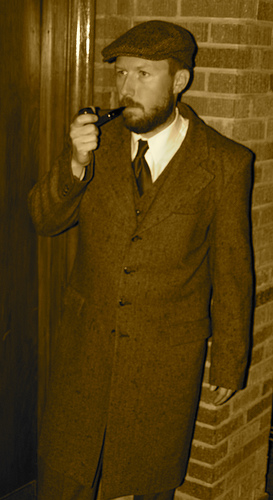Anthony Bower Hawthorne, “The Professor,” was born on a farm in Illinois in 1868. His father was a ne’er-do-well sharecropper, poet, and drunk. His mother was a mousy woman who occasionally spoke in tongues, but never in church.
The eldest of three brothers, A.B. had an unremarkable childhood. Dour and melancholy, he seemed to let his family down at every turn. Although he always did his chores as told, he was joyless on the farm. Primarily as a means to rid themselves of him, A.B.’s parents sent him to away to school in town beginning at age 12, and he was only allowed to come home one weekend per month and one week at Christmas.
But it was there, at school, that young A.B. came into his own. His mind crackled at what he learned. He read voraciously, often staying up well past his aunt and uncle, with whom he lived, reading by the light of an oil lamp. And, of all subjects, theology was his favorite by far.
By age 15, A.B. had outpaced the reading of his classmates and his instructors. He visited every church in town, one by one, reading every book in their libraries. Thereby he learned the history of every denomination, taught himself Latin and Greek, and mastered the writings of the church fathers.
At the behest of his uncle, A.B. applied to and was accepted at Dartmouth College in Hanover, New Hampshire. In 1885, at age 16, he matriculated at Dartmouth. There he continued his study of Latin and Greek and complemented that with the study of Greek and Roman history, archaeology, and philology. He also continued his study of theology. In fact, he was known on campus for having committed to memory long sections of William Ames’s Marrow of Theology.
Whilst in college, A.B. also took to preaching occasionally at the Congregational Church of Hanover. He was known in town for preaching serious and earnest sermons, often quoting up to a dozen theologians, and lasting well over an hour.
Having received his bachelor of divinity, A.B. stayed on at Dartmouth for two years as a junior faculty member before leaving to being his Ph.D. at Princeton. Eight years later, in 1899, A.B. graduated with two doctorates, in theology and philology. 
On an autumn morning in 1901, feeling especially sorry for himself, A.B. walked out of the front door of his apartment building, and began walking, rather aimlessly, through the city. As so often, A.B. was lost in his thoughts and theories as he walked, thinking about some such thing as the hermeneutical framework undergirding the metaphysical foundations of prelapsarian double-predestination when something caught his ear. It was music that he had never before heard. Coming to his senses, A.B. realized that he was in an area of the city he’d never seen before, and he was surrounded by Negroes. Almost in a trance, he followed the singing up the stairs, through the doors, and into the sanctuary of the First African Methodist Episcopal Church of Harlem, and there he saw something he’d only read about in books: a Negro worship service in full bloom. Singing and dancing, shouting and sweating, the sanctuary was electrified. Slowly but steadily, A.B. walked up the center aisle of the church, brushing against busty women waving handkerchiefs and men in white shirts and ties.
Spontaneously, tears began running down his cheeks, and, as unlikely as it may seem, A.B. Hawthorne smiled.
Years later, he would write in his spiritual memoir, Falling Up: A Puritan’s Conversion to Jesus, of that night, “Something happened within me as I walked that aisle in Harlem. I actually felt my head drain, as one does when afflicted with a head cold upon standing up. However, it was not phlegm leaving my sinuses that I felt. Instead, I experienced the sensation of everything I’d learned—all of the Latin and Greek, the verb tenses and conjugations, the theories and axioms, every book I’d read and lecture I’d heard—drain from my head and flood into my heart. As a result, my head cleared for the first time in my memory, and my heart felt as though it would burst.”
Needless to say, A.B. was warmly welcomed by the good people of First AME Church of Harlem. He stayed late into the evening, worshipping and eating, and, yes, hugging the men and women of that church. He returned to his own apartment late that Sunday night, but he did not go to bed. Instead, he started packing his things. The next morning, he moved out of his apartment in Manhattan and rented a room from a family in Harlem.
And there he has lived ever since, a changed man, albeit not completely. A.B. Hawthorne continued the rest of his life to have a proclivity toward a pipe, scotch, and conservative, gray frock suits. But his theology, oh how it changed. In the very years that Albert Schweitzer was a worldwide sensation for declaring that Jesus was no more than an apocalyptic rabbi, A.B. Hawthorne came to think of truth not as a Platonic ethereal concept to be mastered by the intellect but as a man: Jesus. The very same Jesus of which Schweitzer wrote, but not denuded of his divinity. “Albert needs less Bach and more Gospel!” A.W. was known to shout aloud when reading Schweitzer’s books, “He needs less rabbi and more risen Lord!”

